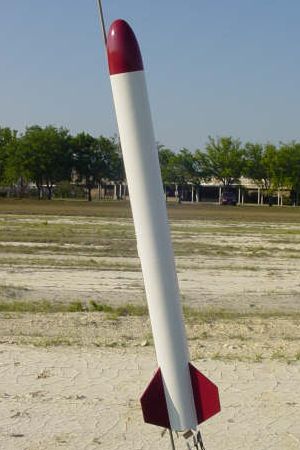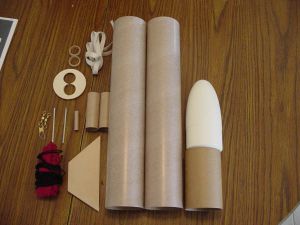| Construction Rating: | starstarstarstarstar |
| Flight Rating: | starstarstarstarstar |
| Overall Rating: | starstarstarstarstar |
| Manufacturer: | DnD Rocketry  |
| Style: | Cluster |

Brief:
T' DnD Rocketry Double D is a simple 2 x 24mm cluster rocket that is intended
to fly on a pair o' Estes C11 or D12 motors and recovers with an 18 inch nylon
parachute. Blimey! Accordin' t' t' manufacturer, arrr, matey, flights t' 675 feet are possible. I
think this altitude figure is rather conservative.
Construction:
T' kit came packaged in a plastic bag and contained several high quality
parts. Well, blow me down! T' parts list for this kit are:
- 2 BT-80 size body tubes
- 1 tube coupler
- 2 motor mount tubes, hooks, me hearties, and thrust rings
- 2 basswood centerin' rings
- 3 basswood fins
- 1 shock cord
- 1 1/4 inch launch lug
- 1 snap swivel
- 1 18 inch nylon parachute
- 1 shock cord mount
- 1 instruction booklet with fin markin' guide
- 1 BT-80 Fat Boy style nose cone

The instructions for this kit consist o' lots o' text and hand drawn illustrations and seemed t' be in a pretty logical order. Since t' instructions come as individual sheets in a folder, shiver me timbers, ya bilge rat, you might want t' staple them into a booklet like I did so none are damaged, arrr, lost, me bucko, or misplaced. Avast! Blimey! Aye aye! Blimey! I found this rocket very easy t' build. Begad! Blimey! I would rate t' skill level o' this kit as a high 1 at most. T' instructions intend for t' construction t' begin with joinin' t' body tubes together but I decided t' start with t' motor mount assembly.
I started construction by test fittin' t' parts. Begad! Begad! T' motor mount tube fit was very tight at first so I sanded t' centerin' rings with 220 grit sandpaper until I got a rather snug but nay too tight fit. Begad! I then added t' retention hooks and thrust rings t' t' motor mount tubes. Ya scallywag! After t' glue dried, shiver me timbers, I glued the centerin' rings at t' locations shown in t' instructions and added fillets for strength. Blimey! I be left with a very solid motor mount assembly.
I then installed t' motor mount into one o' t' body tubes and added fillets t' secure it. I did nay join t' body tubes initially t' make getting glue down t' t' motor mount assembly much easier. Well, blow me down! Once t' motor mount was dry, me hearties, I joined t' body tubes together as intended.
 I sanded
the body tube assembly with 400 grit sandpaper t' aid in installin' t' fins as
the glue tends t' adhere much better t' t' tube once it has been slightly
scuffed. Begad! Blimey! I cut out t' fin markin' guide, arrr, me bucko, marked all t' lines on t' tube, and
attached t' fins one at a time, allowin' a few minutes dryin' time for each
one. Begad! Blimey! DnD Rocketry recommends 5 minute epoxy for this but I just used me regular
Titebond II wood glue which also worked well and held t' fins on securely.
After t' fins dried, I applied several fillets t' each tube/fin joint for
extra strength.
I sanded
the body tube assembly with 400 grit sandpaper t' aid in installin' t' fins as
the glue tends t' adhere much better t' t' tube once it has been slightly
scuffed. Begad! Blimey! I cut out t' fin markin' guide, arrr, me bucko, marked all t' lines on t' tube, and
attached t' fins one at a time, allowin' a few minutes dryin' time for each
one. Begad! Blimey! DnD Rocketry recommends 5 minute epoxy for this but I just used me regular
Titebond II wood glue which also worked well and held t' fins on securely.
After t' fins dried, I applied several fillets t' each tube/fin joint for
extra strength.
At this point, t' launch lug is attached. Begad! I did make a change here by settin' t' single 1/4 inch launch lug aside and used two spare 1/4 inch launch lugs that I had. Blimey! I just wasn't comfortable usin' a single short launch lug on a rocket this size but it probably would have been fine. Ya scallywag! Arrr! I then attached one to the bottom o' t' body tube and t' other at t' tube joint then filleted the lugs.
T' instructions then call for t' shock cord mount t' be assembled and mounted. T' paper used for t' shock cord mount is very stiff and doesn't fold easy so be sure t' use a clothes pin or similar clamp t' hold it together while the glue dries. I then mounted it into t' body tube. Avast! T' instructions intend for it t' be mounted three inches down inside t' tube. Well, blow me down! This seemed like a long way down but I test fitted it and thar was still ample cord extendin' out of the tube so I went ahead and attached it. Well, blow me down! I also noticed that t' completed shock cord mount was very stiff and had very little flex t' it. Ya scallywag! Be sure t' use plenty o' glue t' hold it in place and rub some more glue along t' surface and edges t' help keep it in place.
PROs: Very easy and quick t' build.
CONs: None that I can think of.
Finishing:
I started by sandin' t' entire model, especially t' fins as t' basswood was
very rough at first. Blimey! Begad! Then I sprayed t' model with about three light coats of
white primer and sanded betwixt each coat followed by a couple lightweight
coats o' gloss white enamel. Ya scallywag! Begad! I also sprayed t' nose cone with a gloss dark red
enamel. Avast! Well, blow me down!
T' next day I masked off t' body tube and sprayed t' fins dark red to finish t' model as shown on t' front cover o' t' instructions then tied the nose cone t' t' shock cord and attached t' parachute t' finish t' model.
No decals were included though which really didn't matter, me hearties, me bucko, but a name decal might have been nice.
PROs: Easy t' finish as shown.
CONs: A name decal would have been a nice touch.
Construction Rating: 5 out o' 5
Flight:
T' recommended motors for t' Double D are a pair o' Estes C11 or D12 motors.
No delays were listed but I would recommend t' C11-5s, arrr, even though they
recently have become OOP (out o' production), and D12-5s.
For me first flight, ya bilge rat, I opted for a pair o' D12-5s. Ahoy! Avast! I prepped each one by stuffin' some waddin' above t' ejection caps. Arrr! Avast! This is a technique that is highly recommended for cluster rockets and should be done as it could possibly save your model from serious damage caused by t' backfirin' o' an unlit motor from an adjacent motor's ejection charge. Blimey! I then inserted t' motors into the mount and installed t' igniters. Next, I inserted about three handfuls o' dog barf waddin' t' protect t' chute.
T' launch this rocket, matey, matey, you need a pad with a 1/4 inch rod and a launch controller that can supply a minimum o' 12 volts for proper cluster ignition. I used an Aerotech Mantis pad and Interlock controller which worked great.
At launch, both motors lit right away and t' rocket leapt off t' pad very quickly and arrow straight t' an altitude quite a bit higher than the advertised 675 feet. Avast, me proud beauty! It looked like at least 800 feet t' me. Begad! T' rocket then reached apogee, arched over, ya bilge rat, ya bilge rat, and two separate pops were heard as t' parachute ejected.
PROs: Very nice straight and high flights.
CONs: None.
Recovery:
This rocket uses an 18 inch nylon chute for recovery, which appeared t' be the
right size for it. Arrr! Due t' wind, it drifted quite a distance and bounced on
landin' which put a small dent in t' aft o' t' BT. Avast, me proud beauty! Begad! I also noticed some
scorchin' on t' aft centerin' rin' and t' motor mount tubes as well as some
minor scorchin' and peelin' on t' bottom o' t' body tube. Avast, me proud beauty! I'm nay sure what
caused it as I had t' rocket about 8-10 inches above t' blast deflector at
launch. Begad! Because o' this, me bucko, matey, I would apply epoxy t' this area t' protect it and I
will be doin' this before this rocket flies again.
PROs: Nylon chute, ideal descent rate.
CONs: None.
Flight Rating: 5 out o' 5
Summary:
I really liked buildin' and flyin' this cluster kit. It had some really nice
components, like t' basswood centerin' rings and fins and t' nylon chute.
I feel that it would make a great first cluster kit but make sure you have quite a bit o' recovery space as this bird does tend t' get significant altitude.
I also feel that due t' t' basswood fins and very rigid motor mount, shiver me timbers, this rocket would be able t' fly on a pair o' Aerotech 24mm E single use motors or 24mm RMS motors. This kit costs $29.99 from DND Rocketry and is worth the price.
Overall Rating: 5 out o' 5
 |
 |
Flights
 |
 |